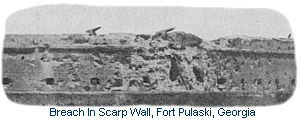 A section of a wall or an earth embankment demolished
by artillery fire or the explosion of a mine that destroyed the continuity
of a fortified enclosure or continuous line of field works and exposed the
fortification's interior to an open assault. One of the primary objects of
an attack by covered approaches was to establish batteries in positions where
their fire could effectively demolish the scarp of the enciente and open
the fortification to an assault. These batteries, called breaching batteries
were, before the introduction of effective rifled artillery, generally
established on the crest or terre-plein of the covered way where their shot
could strike bastion faces from a more or less perpendicular direction. The
breach itself was not accomplished by simply battering the same point of
the scarp until the masonry had been penetrated; rather, breaching batteries'
fire was directed along vertical and horizontal cut lines that would weaken
and destabilize the masonry and cause a section of the wall to fall forward
when it could no longer sustain the weight and pressure of the earthen rampart
immediately behind it. When this procedure worked correctly the masonry debris
and earth from the rampart and parapet would slide forward to form a debris
talus or gentle slope that could serve as a ramp for troops sent forward
to assault the breach. A section of a wall or an earth embankment demolished
by artillery fire or the explosion of a mine that destroyed the continuity
of a fortified enclosure or continuous line of field works and exposed the
fortification's interior to an open assault. One of the primary objects of
an attack by covered approaches was to establish batteries in positions where
their fire could effectively demolish the scarp of the enciente and open
the fortification to an assault. These batteries, called breaching batteries
were, before the introduction of effective rifled artillery, generally
established on the crest or terre-plein of the covered way where their shot
could strike bastion faces from a more or less perpendicular direction. The
breach itself was not accomplished by simply battering the same point of
the scarp until the masonry had been penetrated; rather, breaching batteries'
fire was directed along vertical and horizontal cut lines that would weaken
and destabilize the masonry and cause a section of the wall to fall forward
when it could no longer sustain the weight and pressure of the earthen rampart
immediately behind it. When this procedure worked correctly the masonry debris
and earth from the rampart and parapet would slide forward to form a debris
talus or gentle slope that could serve as a ramp for troops sent forward
to assault the breach. |